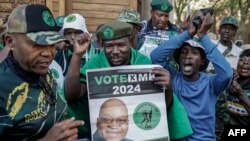South Africa's top court ruled that Zuma is disqualified from standing in the May 29 election because of his 15-month jail sentence for contempt of court in 2021. The nation's constitution prohibits anyone given a prison sentence of 12 months of longer from holding a parliamentary seat.
"It is declared that Mr. Zuma was convicted of an offense and sentenced to more than 12 months' imprisonment, ... and is accordingly not eligible to be a member of, and not qualified to stand for election to, the National Assembly," the constitutional court ruling said.
Lindiwe Mtshali, a 39-year-old member of Zuma's MK party said they “are very disappointed” in the constitutional court’s ruling.
"There is an agenda, of course, to delay the liberation of Black people in this country," Mtshali said while speaking to French media outlet, Agence France-Presse, from outside the court.
The ruling against Zuma's candidacy was expected, but the remaining MK candidates will perform well on May 29, with the former president’s name and face on the ballot papers which are already printed, Mtshali said.
Neeshan Balton, the executive director of the Ahmed Kathrada Foundation, one of the organizations that provided legal advice as amicus curiae, welcomed the ruling against Zuma.
Balton said Zuma "clearly was not going to uphold the constitution," adding, "we are happy that he’s disqualified."
"It reaffirms that if you want to be a candidate, you must pledge as a candidate that you will uphold the constitution," the executive director said.
Zuma was forced to step down from presidency in 2018 after a falling out with the ANC.
Opinion polls suggest South Africa's governing party is at risk after 30 years in power, and Zuma’s party represents a threat to it, especially in the former president's home province of KwaZulu-Natal where he is popular.
In 2021 Zuma's jailing triggered riots in his home province, resulting in the death of over 300 people. His arrest also morphed into a wider spate of looting.
Speaking to local radio station 702, President Cyril Ramaphosa addressed the potential of violence in the wake of the ruling against Zuma.
"I'm not concerned about this instigating violence," Ramaphosa said.
"We have rule of law in South Africa that governs us. Once a constitutional court has decided, that is it and should there be any threat of violence our security forces are ready," the president said.
South Africa's electoral commission originally disqualified Zuma in March, but a month later a court overturned the disqualification saying the relevant section of the constitution applied only to people who had a chance to appeal against their sentences, which had not been the MK leader’s case.
The electoral commission then took the case to the constitutional court. It said previously that even if Zuma was disqualified from standing as a member of parliament, his face will still appear on ballots this month as he is the registered leader of the MK party.
An Ipsos opinion poll published in April said support for MK was roughly at 8%, adding that the governing party had just over 40%.
While the ANC is still on track to get the most votes, if it gets less than 50% support it would have to seek one or more coalition partners to govern the country. This would be the first since South Africa’s first democratic elections in 1994.
Information for this article was sourced from Reuters, Associated Press and Agence France-Presse.







